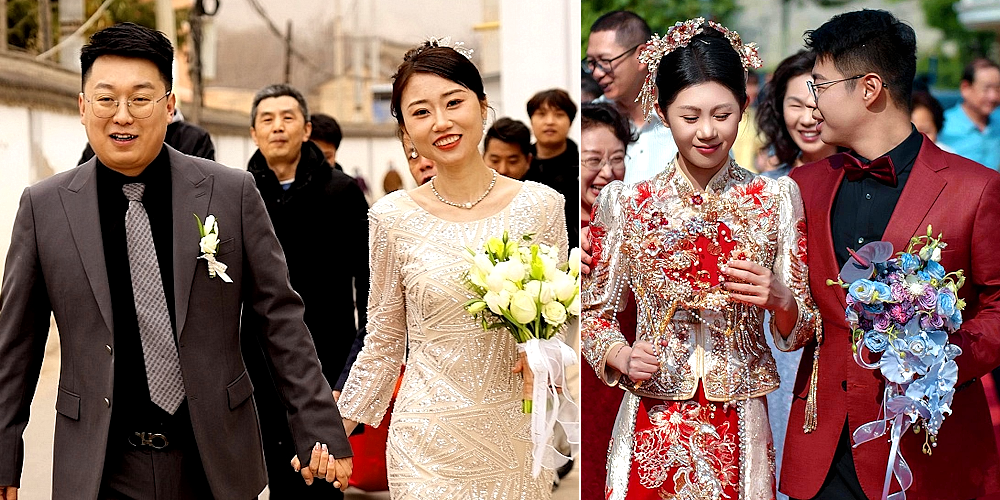When Droya Zhuo, 26, was planning for her wedding in February, she found the process of choosing a bridal gown troublesome.
Appointments with bridal shops had to be made months in advance, and she would need to run around different shops comparing prices to get the best deal when she was already busy enough with work.
So Zhuo, an art teacher in Lanzhou, the capital of Gansu province in north-western China, decided to buy her dress after lunch one day, at a clothing store near her workplace.
During her nuptials, which took place over the Chinese New Year festive period, she and her husband also decided to do away with bridal photography, bridesmaids, groomsmen and wedding cars to save time and effort.
What were once considered obligatory wedding customs are changing in China, with young Chinese like Zhuo and her husband turning away from the fuss that forms the traditional celebrations.
They are going as far as to refuse hongbao or red packets, cancel tea ceremonies and do away with emcees for the wedding banquet.
Instead, they are opting for simpler weddings, with some using vegetables and fruits for decorations that guests can take home after the celebrations, replacing fancy cars with shared bicycles to pick up the bride and holding celebratory meals at fast-food restaurants.
A survey of 1,251 young Chinese by China Youth Daily on June 26 showed that 78.4 per cent favoured simpler weddings, and 63.4 per cent favoured cancelling customs such as gate-crashing.
The topic of weddings came into the spotlight in China earlier in October, when a man from central Hunan province complained online that he received eight invitations over the recent seven-day National Day holiday that ended on Oct 7.
Netizens sympathised with the man, who also lamented about the amount of money he would have to fork out in red packets, which are considered blessings for the happy couples.
It is customary in China to give red packets to newlyweds, even if those invited are not attending the wedding.
Red packets can range from 200 yuan (RM121) – for those who decline invitations – to 2,000 yuan or more, depending on the guests’ relationships with the couple.
The hashtag “Eight invitations over seven days” drew 34 million views, making it to popular microblogging platform Weibo’s list of hottest searches.
Some netizens quipped that the man would spend October – at least – working for the happy couples, given that his salary would most likely be spent on red packets.
Official statistics show that in 2023, the average income of those living in urban cities was 4,318 yuan a month while that of rural residents was 1,807 yuan.
Netizens also started discussing the varied ways that young Chinese are changing customs that older generations had failed to do for fear of displeasing their elders.
Examples include celebrations such as sharing a short video of the happy couple before guests start eating, replacing alcohol with milk tea, and even opting for scratch-card wedding favours.

When Tiffany Ma, 28, was planning her wedding in northern Shanxi province in June 2024, she and her husband-to-be decided to tell their friends not to give them red packets.
She had discovered on social media platforms how increasingly common it was.
When she attended her friends’ weddings, she found it unpleasant to “quantify our friendship into monetary terms”.
“As a host, I found it difficult to invite my friends to my wedding, knowing they would have to undergo the same thought process,” said Ma, who does freelance work in the tech industry.
State media has been publicising how Chinese youth are changing these traditions to make their special day more meaningful – which the central government has been encouraging to lighten what officials call “the burden of favours”.
A crucial part of the red packet exchange is the expectation that guests will eventually recoup what they have given out when they hold their own weddings.
In February, when the central government released its top policy document that focuses on rural revitalisation, it included, for the first time, the phrase “the burden of favours” and promised to roll out measures to encourage rural residents to do away with customs that create social obligations among themselves.
In an editorial on Oct 10, state media outlet Workers’ Daily stated that the new trend of young Chinese “reforming weddings” comes as newlyweds hope to use their celebrations to express their individuality.
The average cost of a wedding has increased to 330,000 yuan in 2023, up from 174,000 yuan in 2020, according to media reports.
Assistant Professor Mu Zheng of the National University of Singapore’s sociology and anthropology department told ST that young Chinese may feel that accepting red packets can make weddings feel transactional.
She said that simpler weddings have become popular in cities, but in some rural areas, the convention of the wedding banquet, bride price and having a house before marriage still prevails.
Wendy Wang, 31, and her husband, who both work in the tech industry in Hangzhou, the capital of eastern Zhejiang province, went for a two-week holiday in Xinjiang autonomous region with two of their best friends in August for their wedding.
The couple then held thank-you ceremonies at each of their hometowns for their parents and relatives.
The lunch ceremony started at 11 a.m., when the newlyweds gave a thank-you speech and played a video of their celebration in north-western Xinjiang.
They then held a lucky draw where guests could win prizes such as home appliances, gift boxes and food.
“I found the entire process – from the holiday in Xinjiang to the lunch ceremonies – meaningful,” she said.
But the switch to fuss-free weddings has drawbacks.
Zhuo said that a neighbour in her hometown of Tianshui in Gansu province asked whether it was her second wedding, a reason for it being simpler and low-key. (It was not.)
She said: “I don’t really care what others think, because I feel that I’m the one living my life.”
But it took a while for her mother to come to terms with the simpler celebrations.
Her sister recently had her wedding photos taken, and her mother said it was a pity that Zhuo did not take any.
Zhuo said: “After I got married, I started sharing how my husband and I would cook together and enjoy our married life. Eventually, my mother stopped minding so much and decided that it was more important that I’m happy.”
Ma is glad she chose not to accept red packets because her friends gave presents that she considered much more meaningful.
One of her best friends made her a traditional fan that she used for her wedding.
“I looked forward to receiving the handmade gift, and I was so glad I could use something so meaningful during my celebration,” said Ma.
“The fan is much more valuable to me than any red packet.”
ADVERTISEMENT
ADVERTISEMENT








































